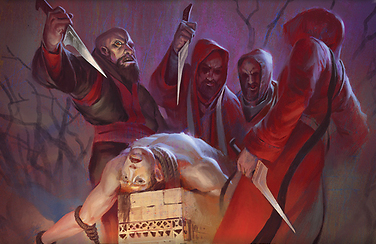The word you chose is "tolerate" which implies your god sees the issue as not worth interfering.
You further have an issue with indirect interference when priests simply ask the god for relevant information and he doesn't provide it. This implies that the god thinks he followers should also "tolerate" the situation to the point where helping them interfere is itself a bigger issue than the original impostors.
A logical assumption would be that the reason for the tolerance comes from the shared "noble" values the god embodies and the priest commit to receive their divine magic including the magic for asking their god for information. The god would be unable to act against those values and the magic would simply fail automatically when the priest tries to ask such a question.
So why would removing the impostors from the church be bad?
I'll ask another question: Why is the church fragmented despite being backed by an active god and priests with divine power in communication with him?
Wouldn't it be an easy answer to say that the church is not backed by the god? That he is not tolerating the impostors but the church itself? And that his tolerance does not extend to active support of the church in form of intervention or information. That would answer both your original question and my added question at the same time.
And this would be fairly simple to explain.
A church is a political organization for organizing religious matters. Nobility and politics do not mix that well. Nobility also implies taking personal responsibility for your beliefs and actions which does not mix well with organized religion with its pre-canned one size fits all answers and dogmatism.
And conversely since humans are inherently social animals the god would have a simple and obvious reason to tolerate humans forming groups and organizations to belong to. And of course being organized and pooling resources does have non-negligible practical benefits.
So the god would tolerate the church and provide power to priest belonging to it but he would not support it in any way. He would not care if it fragments, gets corrupted, or is filled with impostors. He would not provide magic or information for the purpose of "playing politics", and that would mean almost anything involving the church, and people would not expect him to. So lying by omission would not be necessary.
This would also explain why the church is fragmented. Since the god does not expect anything of the church and does not value it, people would feel free to form their own splinter groups whenever convenient and never make an effort to reunite the faith.
This lack of weight would also explain why efforts to keep the church clean of corruption and impostors would fail. It just would not be that high on the priority list of things to do. You have limited time and resources and there are people in real distress and need all around you.
Given time believers might even come to see the corruption of the church in positive light. Finding your true personal faith and belief and living it fully would be your central goal. Having the church corrupted would make it more meaningful by adding contrast. The state of the church would also more or less force all true believers to make their own personal choices and decisions. Just going with the flock would not be viable option.


